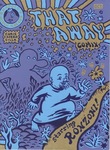

While its original title, Il grande ritratto translates to The Great Portrait, the decision to render it here as The Singularity works to draw attention to its prescience. Originaly published in Italy in 1960, this short novel approaches the theme of machine consciousness that seems to echo – from a vantage point over sixty years in the past – today's AI concerns.
translated from the Italian by Anne Milano Appel
Here's the NYRB write up:
At the beginning of Dino Buzzati’s The Singularity, Ermanno Ismani, an unassuming university professor, is summoned by the minister of defense to accept a two-year, top-secret mission at a mysterious research center, isolated from the world among forests, plunging cliffs, and high mountains. What’s he supposed to do there? Not clear. How long will he be there? No saying.
Still, Ismani takes the mystifying job and, accompanied by his no-nonsense wife, Elisa, heads to the so-called Experimental Camp of Military Zone 36, wondering whether, in the midst of the Cold War, it’s some sort of nuclear project he’s been assigned to. But no, the colleagues the couple meets on arrival assure them, it’s nothing like that. It’s much, much more powerful.
At the center of the research complex is strange, shining, at times murmurous, white wall. Behind it, a deep gorge drops away, full of wires and radio towers and mobile sensors and a host of eccentric structures. A question begins to dawn: Could this be the shape of consciousness itself? And if so, whose?
Buzzati's novella of 1960, a pioneering work of Italian science fiction, is published here in a brisk new translation by Anne Milano Appel. In it, Buzzati explores his favorite themes of love and longing while offering a startlingly prescient parable of artificial intelligence.
Interesting, right?

Known in his native Italy and around the world as a novelist, short story writer, painter and poet, Dino Buzzati took a late-in-life leap into unknown territory in creating Poem Strip (Poema a Fumetti), which is a fascinating blend of all his skills in one work. Originally published in 1969 when Buzatti was 63 years old, equal parts epic poem, surrealist drawings, and graphic novel, Poem Strip is structured around a contemporary reworking of the Orpheus myth – that contains at least a nod to the Jean Cocteau film – with Orpheus (Orfi) here rendered as a rock star set on rescuing his love, Eurydice (Eura) from the underworld. Buzzati builds out from this core with a series of stream of consciousness meditations on sex and death – and bureaucracy – depicted as surrealities composed of decaying cityscapes, rotting aristocracies, mutated technologies and a great deal of feminine pulchritude. So, yes, very much the work of an unreformed Italian male of his time, but certainly formally inventive and thematically interesting, nonetheless.
We still have new copies of this 2009 edition translated by Marina Harss with great hand lettering by none other than Rich Tommaso!










